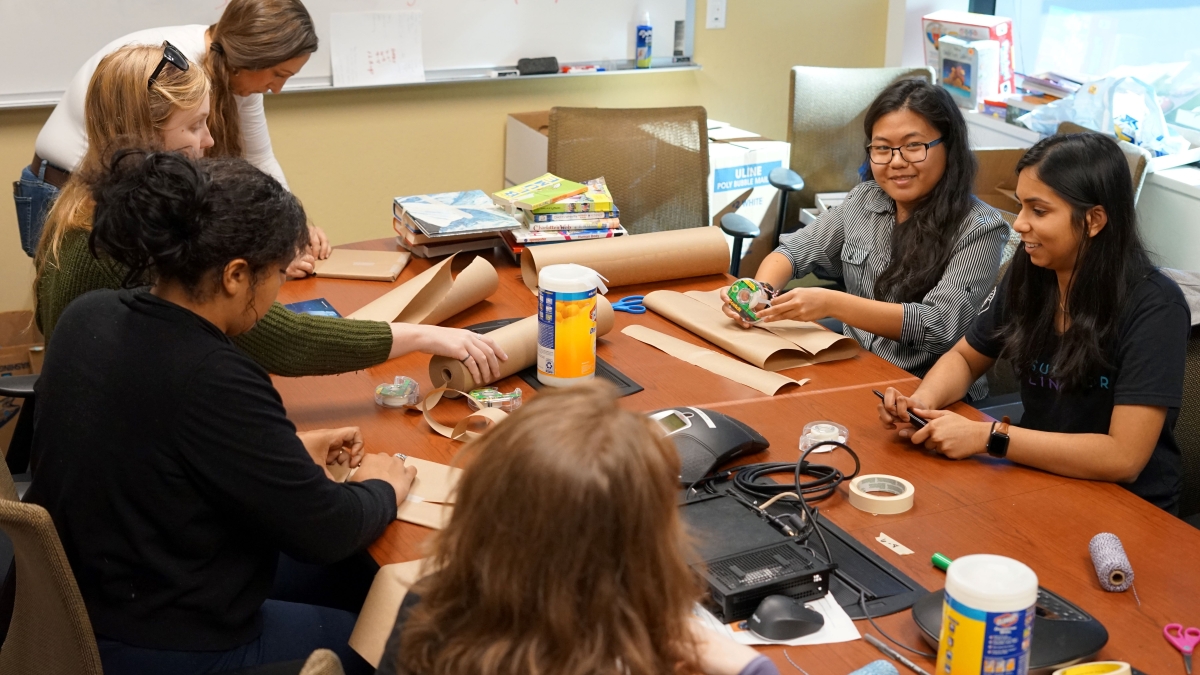ASU-based program that trains students to help domestic violence survivors expands nationwide

Student members of ASU's Survivor Link program participating in a January 2020 day of service wrapped more than 1,000 children's books to be distributed to Valley domestic-violence shelters. Photo by Mark J. Scarp/ASU
Since 2015, School of Social Work Professor Jill Messing and her colleagues have guided an Arizona State University program that has trained hundreds of students to help thousands of domestic violence survivors cope and move ahead with their lives.
Several months ago, thinking about whether Survivor Link‘s accomplishments could be achieved at other universities, Messing contacted colleagues at social work schools across the country. After receiving many positive replies, she applied for a federal grant to fund expansion of the program.
The grant, totaling just over $1 million, will expand funding for the program at ASU and establish Survivor Link at 13 additional campuses in Florida, Indiana, Kansas, Kentucky, Massachusetts, New York, North Carolina, Ohio, Pennsylvania and Texas.
“This funding will allow us to provide funding and domestic violence training to 99 social work students across 11 states” including Arizona, said Messing, director of ASU’s Office of Gender-Based Violence.
Seven years ago, Messing started Survivor Link. The award-winning AmeriCorps program has provided multifaceted support to more than 3,000 domestic violence survivors and has trained 445 student members at ASU as domestic violence advocates in collaboration with the Arizona Coalition to End Sexual and Domestic Violence.
Survivor Link is among recipients of the annual Public Health AmeriCorps awards, a collaboration between AmeriCorps, the federal Centers for Disease Control and Prevention and the Corporation for National and Community Service. The collaboration is investing $400 million over five years to help meet public health needs and advance more equitable health outcomes for socially vulnerable groups.
“The aim of our project is to build capacity within nonprofit and government public health and complementary agencies to respond to domestic violence in their local communities, thus enabling the organization to provide sustained and effective intimate partner violence services and increasing the reach of the program,” Messing said.
With the new funding, which begins in August, Survivor Link will also provide future social workers here and on the other campuses — who have been trained in domestic violence response — opportunities to pursue careers in public-health-related fields, she said.
“The program has the potential to make a large contribution to public health across the United States by improving services and interventions for survivors and training the next generation of social workers to respond to intimate partner violence,” Messing said.
Survivor Link’s expansion will help meet the growing need for public health workers to be more knowledgeable about domestic violence, as one-third of women experience domestic violence in their lifetimes, Messing said.
“This funding will enable Survivor Link’s success at ASU, which has supported more than 3,000 domestic violence survivors and helped train hundreds of students as domestic violence advocates, to be brought to so many more parts of the country," said Foundation Professor Elizabeth Lightfoot, director of ASU’s School of Social Work.
“It’s a tribute to the work of Professor Messing, her colleagues and their students that Survivor Link’s commitment to offering solutions and raising public awareness will be established on 14 campuses nationwide.”
In 2020, ASU President Michael Crow honored Survivor Link with the President’s Medal for Social Embeddedness. At ASU, Survivor Link student members have logged more than 190,000 hours of service by engaging daily in interventions to help survivors understand their risks and make plans for safety, Messing said. Student members, who were trained by Survivor Link at ASU in collaboration with the Arizona Coalition to End Sexual and Domestic Violence, have earned over $1.2 million in scholarships, she said.
Messing said she plans to hire a chief trainer in July.
Once the program is in operation at the schools, each will have between three and 12 Survivor Link Public Health and AmeriCorps members, enabling students to work in teams to increase their knowledge and ability to provide evidence-based intervention.
In addition to ASU, the other schools are located at the University of Central Florida, Ball State University, University of Kansas, University of Louisville, Simmons University, University at Albany-State University of New York, University of North Carolina, North Carolina State University, Case Western Reserve University, University of Pennsylvania, University of Pittsburgh, University of Texas-Arlington and University of Texas-Austin.